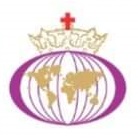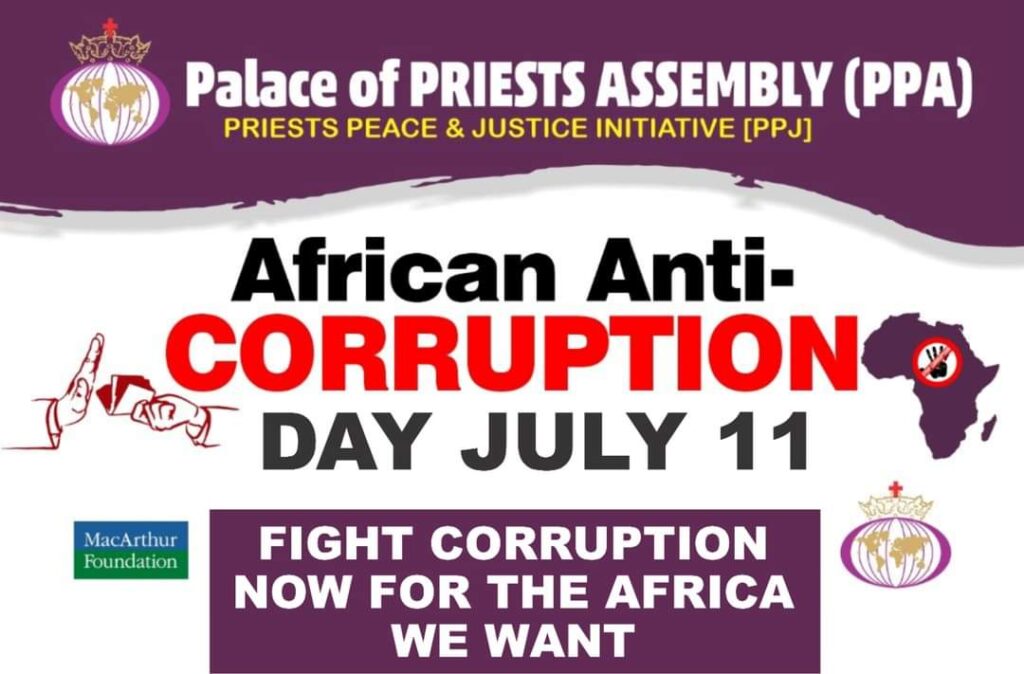The Palace of Priests Assembly and its social arm, the Priests Peace & Justice Initiative (PPJ) joins the rest of the African community to mark the African Anti-corruption Day 2023 and calls on Pentecostals to renew their determination to fight corruption by setting up social arms as instruments in the fight against the menace.
The theme of this year’s African Anti-corruption Day 2023 is “Fight Corruption Now for the Africa we want”.
Corruption remains a significant challenge in many African countries, undermining socio-economic development, eroding public trust, and hindering progress. As an organization dedicated to the principles of transparency, integrity, and accountability, we strongly support efforts to combat corruption and promote ethical practices at all levels of society. At the heart of this covenant is a commitment to pursue justice with the people and righteousness with God. Corruption is also an injustice against the people.

From a biblical perspective, the purpose of government is to promote the good. The ultimate good of human society is to ensure that people live in peace and prosperity so they will serve God acceptably. So, corrupt leaders that deprive the people of the resources which God has bestowed on them are a violation of the rights of the people. In secular scholarship, there is a growing understanding that corruption is a violation of human rights. It has moved from a leadership misdemeanor to a fundamental human rights violation.

On this African Anti-Corruption Day, we emphasize the importance of collaborative action and the need for a multi-stakeholder approach to address corruption effectively. It is crucial for the people of faith, governments, civil society organizations, private sector entities, and citizens to work together in building robust anti-corruption frameworks and implementing comprehensive measures to prevent, detect, and prosecute corrupt practices.
In a press statement issued in Abuja by Dr. Agbaji Orinya ,the Program Manager of Priests Peace & Justice Initiative, an arm of the Palace of Priests Assembly, he stated that Christians have a responsibility to stand against corruption because corruption is a sinful social order that militates against the purpose and plan of God for the governance of human society.
While recognizing the efforts made by governments and institutions across the continent to strengthen anti-corruption mechanisms and enact legislation that promotes transparency and accountability, Dr. Orinya noted that there is still much work to be done and It is imperative that these commitments translate into concrete actions, leading to tangible results in the fight against corruption and called upon governments to prioritize anti-corruption efforts and allocate adequate resources to strengthen institutions responsible for combating Corruption,
While urging individuals, businesses, and organizations to embrace ethical practices, reject corrupt behaviors, and contribute to a transparent and accountable society, he enjoined the Pentecostal Christians, and the entire community of protestant Christianity to examine the biblical warrant for asking Christians to commit to the fight against corruption and stand out clearly in the anti-corruption campaign and advocacy because God is a sovereign God who has identified himself with justice and compassion and has called His people and whoever will work together with Him to fight for justice.
Dr. Orinya urged all Nigerians, especially Pentecostals to support this year’s theme “Fight corruption Now for the Africa we want” and return to the dual mandate of the church, to support, establish and institutionalize social arms for the Church as an instrument to fight corruption and social injustice. He urged all PPA beneficiaries especially those in the 26 states where PPA has a presence to mark the day by taking different actions in line with the ongoing leader’s month of action by preaching anti-corruption messages in their sermons, organizing rallies, and holding pep talks using different touchpoints to create awareness of the costs and consequences of corruption.
